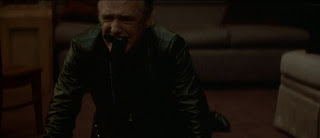
He comes in - "Where's my bourbon?" - and everything shifts. It isn't that the film isn't strange or disturbing before Frank appears, I mean, he comes in right after Dorothy catches Jeffery in the closet - but he turns it into something altogether new. I wish I could find some record of my initial reaction - I know most of the attention, at the time, was toward Hopper's performance. The film as a whole is, and was, an overwhelming experience - it was, I am pretty sure, the most completely absorbing film I had ever seen. I'd say it was the first time a film had seemed completely satisfying, but I'd seen films like Brazil and Dr. Strangelove by then that had a lot of the same effect - but I think it was a good deal more overwhelming than they were. The way it looked, sounded - and Dennis Hopper.

He explodes. A lot of it is the character, Frank Booth is somewhere off the charts of madness - but the intense strangeness of the character is only worth so much. Hopper completely commits to it, pushes it where it goes - the character is over the top - he is over the top - he does not give you anything to hang on to. He forces you to take the film seriously (even as a big part of its power comes from how funny it is) - that horror/disgust/comedy is part of the secret - you have no way out. You have to accept the film's world, its people and stories, and go with it. It's riveting.

Now the film - makes sense. As usual with Lynch, the logic is dream logic - here given an explicit Oedipal turn ("Daddy wants to fuck!" - "Is that your mom?"), linked back to the real world (Mr. Beaumont's breathing apparatus and Frank's gas mask, say.)


But sense is not all. And shock and horror is not all - Hopper doesn't just give you menace, he gives you - something. His need, or whatever you call it - his reaction to the music, particularly, to Ben - is more than just threat, more than just pulling faces.

What is he looking for? What does he want? Part of what makes this film so great is the way the Oedipal significance is complicated - Frank is as much child as father, as lost, in a sense, as Jeffery is. They are doubles. And for that to work - Frank has to be more than just horrifying - he has to be seductive, and he has to be - lost, somehow; longing. Jeffery has to see himself in Frank, and Hopper has to show us what he sees.... and Hopper does it.


This was the film that convinced me that film was capable of art as good as any art form. It's as stunning today as it ever way, and Hopper still as magnificent. So - for that - I think him.

No comments:
Post a Comment